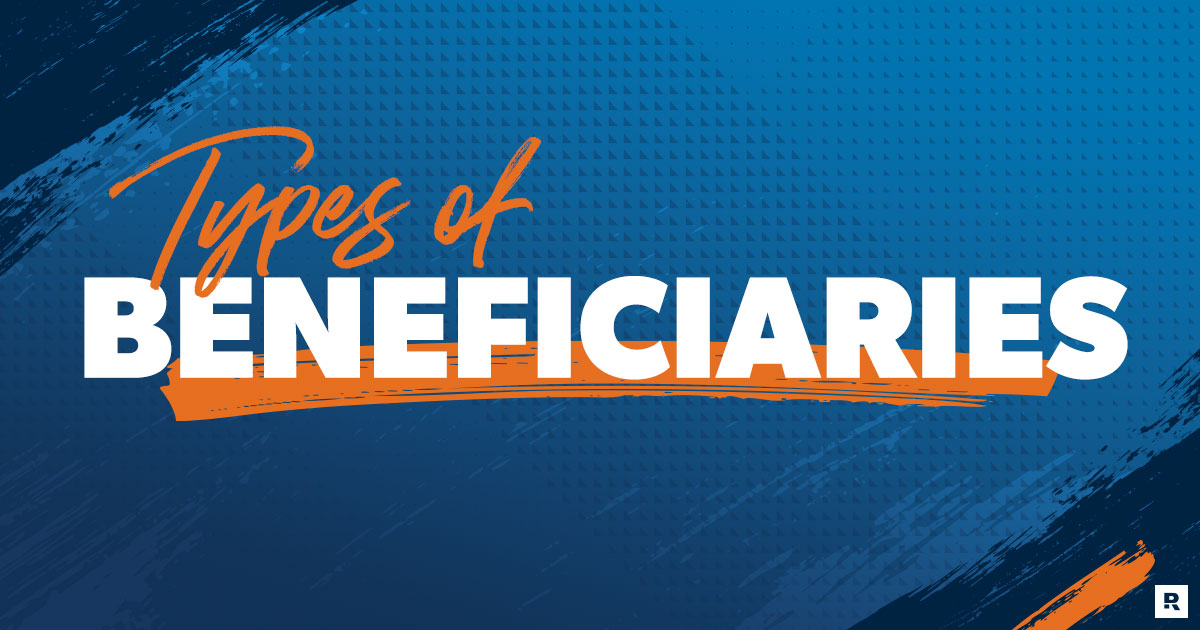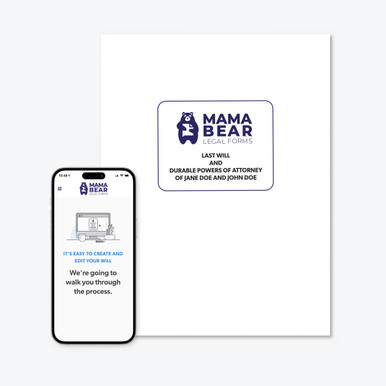
Key Takeaways
- A beneficiary is the person or organization you name in your will or life insurance policy to get your stuff when you pass away.
- Primary beneficiaries are first in line to receive the assets, and contingent beneficiaries are your backup in case your primary beneficiary isn’t available.
- If you don’t name any beneficiaries (or they aren’t available), your assets go through probate court and risk getting eaten up by administrative costs.
- It’s important to keep your beneficiary choices updated so your assets are distributed according to your wishes.
Beneficiary. It’s not a word you come across every day—or every year, for that matter—but when you’re deciding who gets your stuff when you pass away, you’re going to see it a lot. So knowing everything you can about beneficiaries is super important.
Save 10% on your will with the RAMSEY10 promo code.
Not only are there different types of beneficiaries, but it also makes a difference where you name them. That means the beneficiaries you name in estate planning docs (wills, trusts, etc.) and in non-estate planning docs (life insurance, savings accounts, etc.) better match up. If not, the wrong people might get your stuff.
Let’s dig deeper together.
- Primary Beneficiary
- Contingent Beneficiary
- Residuary Beneficiary
- Estate Planning Beneficiary vs. Non-Estate Planning Beneficiary
- Frequently Asked Questions
1. Primary Beneficiary
First things first. The primary beneficiary is the person or organization you name in your will or life insurance policy as first in line to get your stuff when you pass away.
Primary beneficiaries aren’t limited to just people. You could name your favorite charity as your primary beneficiary if you want. For example, let’s say you’re a fierce animal lover. (And frankly who doesn’t love our furry, four-footed friends?) You could name your favorite animal charity as your primary beneficiary.
Another thing to think about: If your primary beneficiary isn’t around to get your assets, and you didn’t name a contingent beneficiary—we’ll explain what that is in a minute—your assets go through probate court and risk getting eaten up by administrative costs. Don’t let this happen!
But before we get into setting up your contingent beneficiary, here are a couple things you can do to help make sure your primary beneficiary gets your stuff:
- Include detailed information about your primary beneficiary, like their legal name, contact information and Social Security number, in your documents and accounts. Don’t just say “my spouse”—that might cause confusion, red tape and unnecessary court costs.
- Be specific about how your assets are split up and use percentages instead of dollar amounts. Here’s why: The $5,000 you invested in a brokerage account a few years ago is now worth $12,000 (nice work!), and you want that extra $7,000 to go to your loved ones, not the state.
2. Contingent Beneficiary
Plan B to the rescue!
If your primary beneficiary isn’t available, the best way to cover your, uh, assets is to make sure you name a contingent beneficiary.
A contingent beneficiary is basically just your backup beneficiary in case your first choice (your primary beneficiary) isn’t available. You can (and should) name both a primary and a contingent beneficiary in all of your estate planning documents and non-estate planning accounts. How come?
Suppose you name your sister Jean as your primary beneficiary, then Jean unexpectedly passes away before you do. If you haven’t updated your estate planning docs and haven’t named a contingent beneficiary, guess where all your money goes?
Don't Know Where to Start With a Will?
Download our will worksheet to get started.
Yep, the state. Depending on where you live, your state will most likely consider your assets unclaimed and process them through probate. This usually means more administrative costs and less money for your loved ones.
3. Residuary Beneficiary
Now for the final type of beneficiary. A residuary beneficiary (could be a person or an organization) can receive assets in one of two ways. Either they get what’s not specifically left to a primary or contingent beneficiary, or they get the assets that a primary or contingent beneficiary is unable to collect (maybe because they died or can’t be located).
Let’s use the second situation as an example. Suppose you leave all your assets to your spouse of 30 years and don’t name a contingent beneficiary. But you did remember to name your closest friend as residuary beneficiary.
Unfortunately, your spouse passes away before you do. What happens to your stuff?
Since you haven’t updated your estate planning documents, your assets will go to your closest friend because your primary beneficiary isn’t available, and you didn’t name a contingent beneficiary. That’s how residuary beneficiaries work.
4. Estate Planning Beneficiary vs. Non-Estate Planning Beneficiary
This one’s easy.
Let’s say you want your cousin Jim to inherit your beach house in Florida. So, you mention that in your will and you’re good to go, right? Not quite.
You have to update the deed to your beach house and name Jim as a beneficiary. In fact, if your will says Jim gets your beach house but your deed doesn’t say that, then Jim’s not getting the house. The same goes for things like 401(k)s, investment accounts, bank accounts and life insurance policies. The primary paperwork tied to those accounts will override your will every time.
So—and this is important—naming a beneficiary for an asset in your will does not automatically update all the other paperwork tied to that asset. You have to update your non-estate-planning docs too.
Beneficiary Rules for Wills, Trusts, Personal Property, Life Insurance, Brokerage Accounts and Savings Accounts
Now let’s go over what estate planning and non-estate planning beneficiaries have in common. Whether you’re naming a beneficiary in your will or for your savings account, the same rules and advice apply, including:
- Enter detailed information for each beneficiary (legal name, contact information, Social Security number).
- Always name both a primary and alternate (contingent, residuary) beneficiary.
- If the primary beneficiary isn’t available, proceeds would go to the contingent beneficiary. (Is this starting to sound familiar?)
- If no beneficiaries are available, proceeds are paid to your estate and subject to a probate process.
- As usual, you can name people and/or organizations as beneficiaries.
- If you name more than one beneficiary, use percentages (not amounts) to specify how much of the payout goes to each beneficiary.
- Update your beneficiary choices whenever you have a life change (birth, death, divorce, etc.).
Interested in learning more about estate planning?
Sign up to receive helpful guidance and tools.
Put Your Knowledge to Good Use
Now that you know all the important stuff about each type of beneficiary, it’s time to get started on your will. What’s the smartest way to create your will and avoid attorney fees? Using an online attorney-created will form.
The best one we’ve found is from RamseyTrusted provider Mama Bear Legal Forms. They make it super easy—all you do is plug in your information, including your beneficiaries, and the rest is done for you. And guess what else? You can make changes for free for the first six months. Nice!
Complete Last Will Package for Married Couples
Complete Last Will Package for Individuals
5. Frequently Asked Questions
Still have questions? Check out these FAQs for answers.
-
Is a residuary beneficiary the same as a contingent beneficiary?
-
No, they’re not the same. The main difference between a contingent beneficiary and a residuary beneficiary is that a contingent beneficiary is second in line to receive assets from the decedent (the person who died).
A residuary beneficiary, on the other hand, gets what’s left over if the primary and contingent beneficiaries are both unavailable to receive assets, or if they forfeit their inheritance (for whatever reason). They also get any assets that weren’t specifically left to anyone—basically, they get the leftovers.
-
What’s the difference between a beneficiary and an heir?
-
In general, an heir inherits property automatically as a close relative of the decedent. In contrast, a beneficiary is someone named in a legal document to receive a decedent’s assets.
-
Can you have multiple contingent beneficiaries? How do you split up the percentages?
-
Yes, you can name a different contingent beneficiary for each asset you own, or you can name multiple contingent beneficiaries for a single asset. Just make sure you state the percentage of the asset that each beneficiary should receive and that the total adds up to 100%. Also, remember to update all your documents and accounts—estate planning and non-estate planning—when naming beneficiaries.
-
How do you pick a contingent beneficiary?
-
The best way to pick a contingent beneficiary is to consider the same characteristics that you did for your primary beneficiary: trustworthiness, age, and ability to manage money.
-
Can the primary and contingent beneficiaries be the same person?
-
Technically yes, but we don’t recommend it. Here’s why: If you name the same person as both the primary and contingent beneficiary, and that person isn’t available when you pass away, your assets will stay in your estate and go through the probate process. Ugh!
-
Do life insurance beneficiaries have to match will beneficiaries?
-
No, you don’t have to name the same person as your life insurance beneficiary and your will beneficiary—a life insurance policy is completely separate from a will.
-
Do will beneficiaries override life insurance beneficiaries?
-
No, will beneficiaries do not override life insurance beneficiaries—a life insurance policy is completely separate from a will.
-
Can you change your will's beneficiaries at any time?
-
Yes, you can. Here’s our advice on how to do it legally.
Use a codicil. If you change your mind about who you want as the beneficiary of your assets when you pass away, make the change on the official form you used to name your original beneficiary. If you just cross out the original beneficiary’s name on a printed copy of the document, it’s not considered a legal change.





